[Domestic] Peaceful Unification Bulletin No. 216 "'80th Anniversary of Liberation!' Lee Jae Myung Government takes office, Rethinks democracy and peaceful unification" Beginning of the Post-Cold War Era, Should design a future from 'Liberation' to 'Peace'"
- Media Communication Division
- 07-01-2025 ~ 08-31-2025
Peaceful Unification Bulletin No. 216 "'80th Anniversary of Liberation!' Lee Jae Myung Government takes office, Rethinks democracy and peaceful unification" Beginning of the Post-Cold War Era, Should design a future from 'Liberation' to 'Peace'"
By Park Myoung-kyu, Professor Emeritus, Seoul National University and Endowed professor, Gwangju Institute of Science and Technology
It is difficult to find a precedent for the wars and conflicts that are going on in various parts of the world and the unexpected changes in the international order. In this time of upheaval, it is a great relief that the new Lee Jae Myung government has taken office to reorganize our systemic capabilities and explore future-oriented policies. We can look forward to dreaming of a new Korean Peninsula based on the historical achievements of the past 80 years since liberation.
Korea's development is truly remarkable. Passion and hard work to make a better life have driven economic growth and dedicated struggle and belief in individuality and human rights have engineered democratization. The diligence for a better life and social consciousness of the Korean people led the country to open up, globalize, and develop an information society, with the country now being armed with the world's most advanced technology and K-pop dynamism.
Lessons from 30 Years of the Cold War and Historical Changes
One of the indispensable elements of South Korea's capabilities is its ability to react and respond aptly during the turbulent periods of world history. When the Cold War ended with the disbandment of the communist Soviet Union and the transition of the Eastern Bloc regimes, South Korea promptly adopted Northern Policy to expand its diplomatic, economic, and cultural horizons. As China pursued an earnest reform and opening-up policy, South Korea and China established diplomatic relations, and economic, social, and cultural ties between the two countries have since expanded to a level beyond imagination.
As the world was being connected through transportation, logistics, information, investment, and culture, South Korea actively promoted globalization, informatization, and open-up policy. It was a remarkable achievement for the country to create a growth engine in response to rapid historical changes of the world.
The same is true for South-North relations. The 1988 "July 7 Declaration," which came in a time passing over to the Post-Cold War period, ushered in a new era by declaring that the two Koreas were no longer enemies but partners as one people. The Inter-Korean Basic Agreement, drafted around the time of German unification, defined South and North Korea as "a provisional special relationship seeking unification, not a relationship between states," and established a gradual unification plan that would expand and strengthen ethnic community through exchanges, cooperation, and tension reduction. Based on this agreement, the two sides held several inter-Korean summits, engaged in various inter-Korean exchanges, operated the Kaesong Industrial Complex and organized tours of Geumgangsan Mountain. South Korean private and religious organizations have also been active in providing humanitarian assistance to North Korea. Public perception has improved and geopolitical risks on the Korean Peninsula have been greatly reduced. There have been the roller coaster of political ups and downs, but the goal of advancing inter-Korean relations has remained constant and there had been a broad consensus. This was the basis of hope and expectation for the future of the Korean Peninsula.
The world we face in 2025 is evidently different from the Post-Cold War era of the last 30 years. The liberal world order that underpinned the era of globalization is being shaken, and the United States is holding overwhelming hegemonic power, and global governance institutions and the free trade system are being steadily weakened. The escalating U.S.-China hegemonic rivalry, the rise of the Global South, the Israeli-Hezbollah war, and the Ukraine-Russia war are tangible examples of this stirring world order. Security and economic uncertainties have increased since the inauguration of President Donald Trump, who puts America first and prioritizes U.S. interests and tariff barriers over alliance values and free trade. North Korea is more reliant on its nuclear power, no longer willing to engage in inter-Korean exchanges and cooperation.
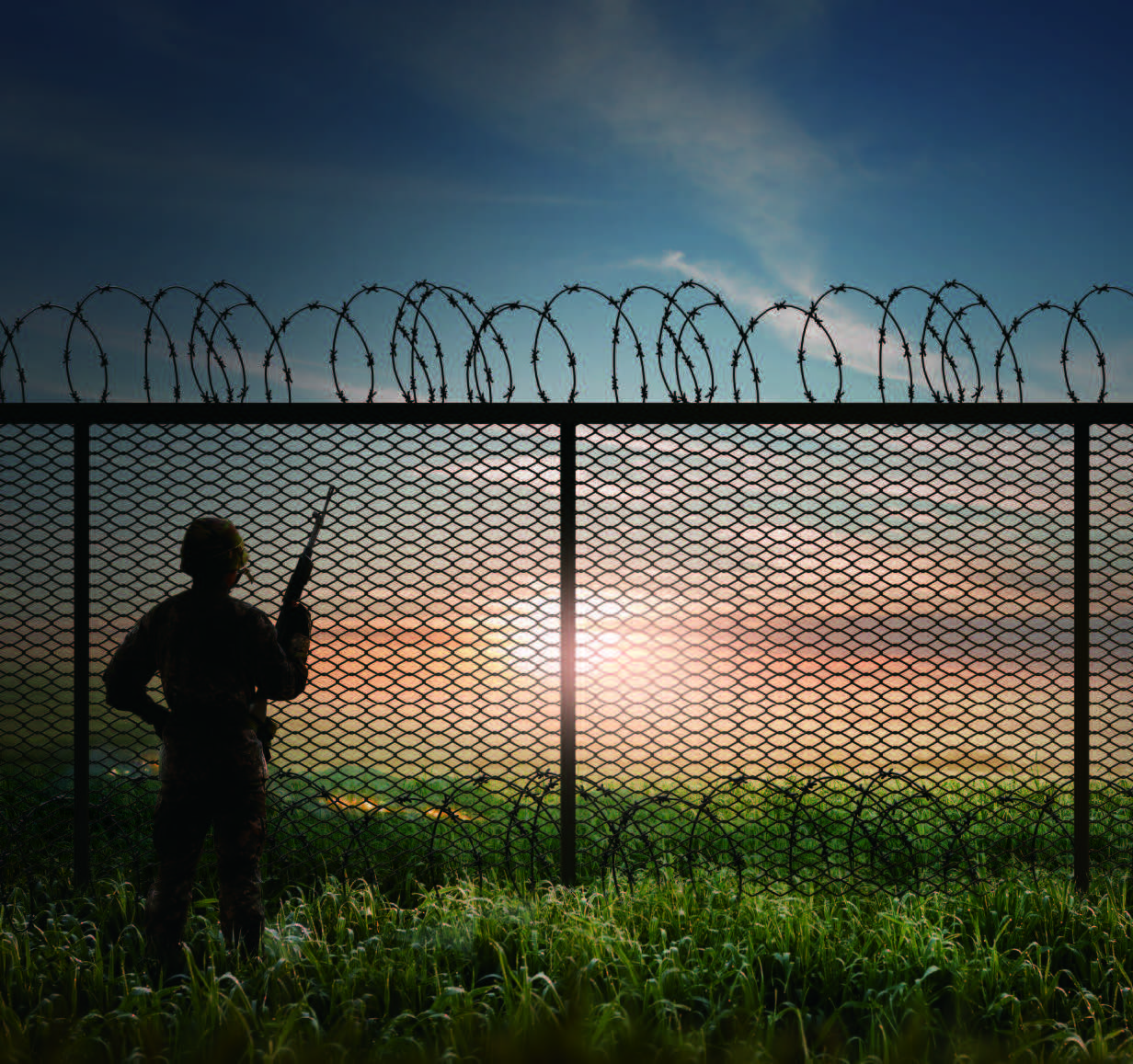
1. It has been 80 years since Korea's liberation, but confrontations along the Military Demarcation Line have been escalating. ⓒClipart Korea
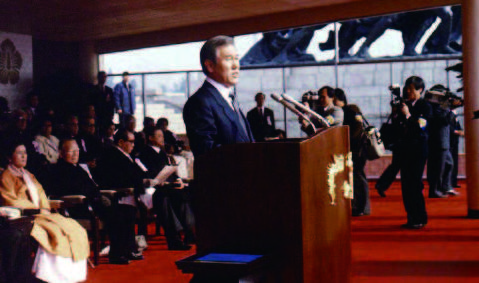
2. The July 7 Declaration is a ‘special presidential declaration for national pride, unification and prosperity issued by South Korean President Roh Tae-woo on July 7, 1988. ⓒ National Archives of Korea
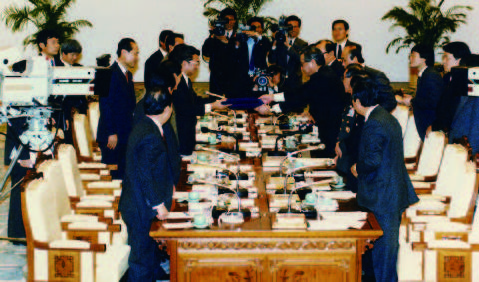
3. A scene of the fifth inter-Korean high-level meeting held in Seoul in December 1991, which resulted in the adoption of the Inter-Korean Basic Agreement. ⓒ Ministry of Unification
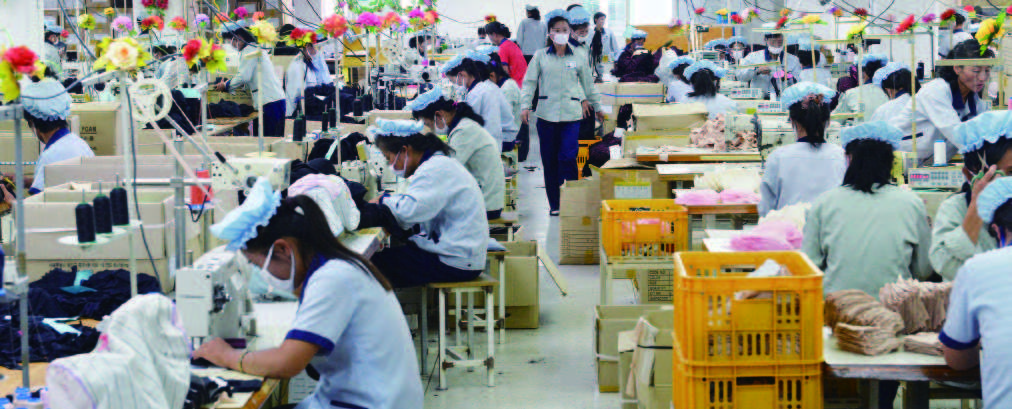
4. A view of a textile company in Kaesong Industrial Complex. The complex was established in 2004 as part of Inter-Korean economic cooperation, but was completely suspended after North Korea's nuclear test in 2016. ⓒSPN
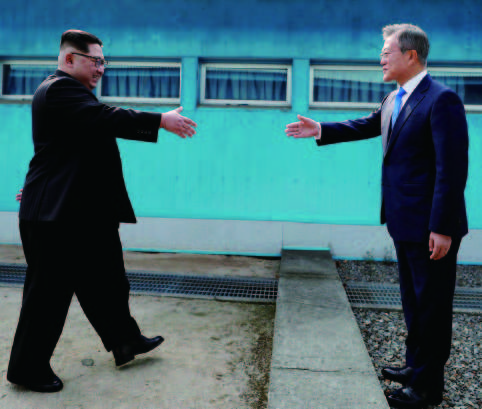
5. A handshake between the leaders of the two Koreas at Panmunjom in 2018. ⓒReuters
This situation can be characterized as an interregnum, or a period of transition in which the existing order is weakening yet a new order has not emerged. In such a time, uncertainty and complex crises increase. The world order and international environment we had utilized in the Post-Cold War era has changed remarkably, and advances in technology are adding to the complexity of hyperconnectivity, creating butterfly effects that can turn small shocks into large risks. Future shocks and risks may come in unexpected forms across multiple dimensions, such as economics, psychology, culture, technology, and emotions, making it even more necessary to build complex capabilities to prepare for future shocks. Concerns are also rising about the risk of a new Cold War in Northeast Asia.
For South Korea, where the role and weight of the ROK-U.S. alliance is very important, the shockwaves of these changes are hardly small.
'Peaceful unification' -- an important value and future vision
Now is the time to prepare for the next 30 years. The 80th anniversary of Korea's liberation should mark the beginning of preparations for the next 30 years of the Post-Cold War era. We need to be flexible and agile to wisely promote a vision for the future of the Korean Peninsula while keeping a watchful eye on the changing world order. While keeping the end of the Cold War as the basic premise, it is important to fundamentally reflect on the policies that have been implemented and to reaffirm our principles and visions that we need to hold on. Above all, we need to make sincere efforts to raise our awareness and responsiveness to the increasingly severe conditions of the times.
In such a situation, the two issues of democracy and peaceful unification are even more important. The bottom line is that these two issues will remain essential and crucial, and become core values for which renewed wisdom and effort are required. This is because Korea's developmental momentum and future prospects both are based on them. Yet, it is imperative to consider the current situation, which cannot allow approaches of the Cold War or Post-Cold War times. Efforts to build a new vision for the post-Post-Cold War era, beyond the 30 Post-Cold War years, are urgently needed.
First, it is necessary to clearly reaffirm that peace and unification are extremely important values and a future vision. No matter how difficult the geopolitical situation on the Korean Peninsula is or how dark the current circumstances are, these two values can never be neglected when viewed through the long history. While the nation should not be equated solely with bloodline, the value and strength of a historical community sharing culture and language for long must not be underestimated. At the same time, it must be recognized that peace and unification are interconnected yet distinct, and their convergence is never simple. Both the belief that peace is a panacea and unification is all the best are attitudes that ignore this delicate interdependence. On the Korean Peninsula, unification without peace or peace without prospects for unification cannot be pursued and is undesirable. There are distinctions across political, economic, and cultural spheres, and there are multi-x-x-layered relationships in both inter-Korean relations and international relations. Ignoring these complex linkages risks incurring significant costs and escalating tensions. It goes without saying that governance must function with a proper understanding of these complex attributes.
The profound changes Korean society is going through must also be given serious consideration. First, national sentiment and perceptions of North Korea have changed greatly due to generational change. In the consciousness of most Koreans, the space for the experience of division and war is fading. For those in their 60s and older, the sweat of postwar reconstruction and industrialization stands as a powerful generational experience. For those in their 40s and 50s, the dynamic changes of democratization and globalization may well be deeply etched. For today's youth in their 20s, the era after the digital age is all history, tradition, and constructed memory.
It is not surprising that aversion and hostility toward North Korea are growing. As the number of foreign residents increase and multiculturalism advances, long-held ethnic sentiments and bloodline consciousness have also significantly faded. Numerous public opinion surveys show that perceptions of North Korea in South Korean society are shifting negatively. This change is highly likely to relegate interest in unification to a secondary concern. In fact, after North Korea abandoned the goal of unification, arguments supporting the North’s two-state theory have emerged within our own society. It is an undeniable fact that opinion polls show that skepticism toward unification is growing. We need to revisit the spirit of the early Post-Cold War era. Efforts are required to upgrade and adapt the spirit of the July 7 1988 Declaration and the Inter-Korean Basic Agreement to the Post-Cold War situation.
Perhaps the core of this lies in abandoning the pursuit of forced unification, refraining from pushing for deliberate absorption unification, and instead envisioning unification as a phased, long-term goal while maintaining a state of peace. Serious contemplation and effort are required on how to implement this spirit in the changed circumstances of the times. The Peaceful Unification Advisory Council must enhance its capacity for innovation and communication. It also requires a serious reflection on democracy. We are overconfident in believing we have achieved democratization, yet its danger can come from both above and below. Today's democracies are gravely threatened by the distortion of information caused by the proliferation of social media, biased collective sentiment, and mass sway. Unless we make efforts guard against populism and expand social cohesion through democratic information communication, our society will continue to experience instability and a roller coaster of ups and downs. The message of peace is a prioritized value in times of increasing risk of military conflict. We have already suffered the devastation of the Korean War, and the last thing we should see is another war on the Korean Peninsula. To do so, it is necessary to secure a strong defense power, but it is even more necessary to develop a strong peace diplomacy capacity with the international community. In addition, it is necessary to send and manage messages to ensure that South and North Korea maintain the minimum consensus that war is not allowed.
The Peaceful Unification Advisory Council is a constitutional institution established for this noble zeitgeist. It is the only unique organization in the world that encompasses even the Korean diaspora around the world under the values of democracy and peaceful unification. While it has accomplished meaningful achievements on various levels, but there are still many challenges to innovate to meet the needs of the new era. It needs to strengthen its friendly yet critical, nationalistic and globalist presence in Korean society while weaving the diverse thoughts and interests of ethnic Koreans around the world. As we prepare for the next 30 years of the Post-Cold War era, the PUAC will also need to faithfully self-innovate to bolster its communication capacity and perform its own role to globalize new imaginations.
It is hoped that the inauguration of the Lee Jae Myung government on the 80th anniversary of the liberation will become a starting point for innovation to deal with the Post-Cold War era.
Next Article
Peaceful Unification Bulletin No. 217 "'Today on the Border Area, Changes on the Front Lines of the Divide as Told by Residents,’ Tales of Life Heard Upon the End of the Loudspeaker Broadcast’"
Previous Article
Human Rights and North Korean Defectors Support Standing Committee, a Field-oriented Standing Committee to Improve Human Rights in North Korea and Support Defectors' Resettlement," "Practical Policy Proposals and Activities for Customized Support for Defectors' Life Cycle
-
How satisfied are you with the information you have reviewed?







